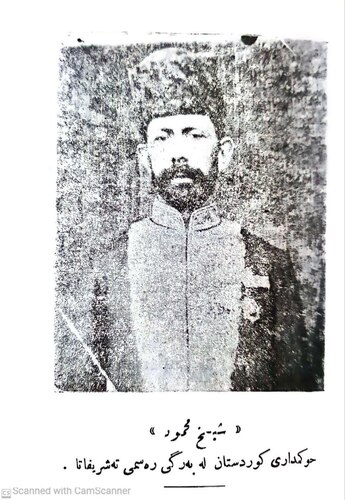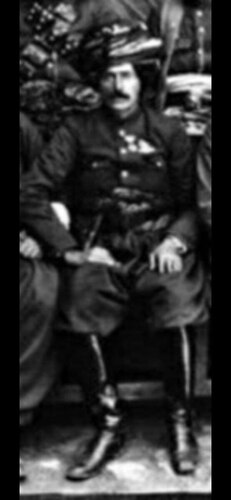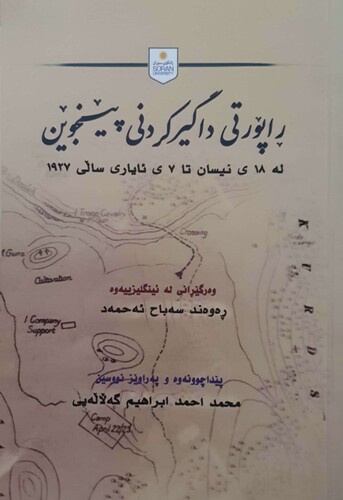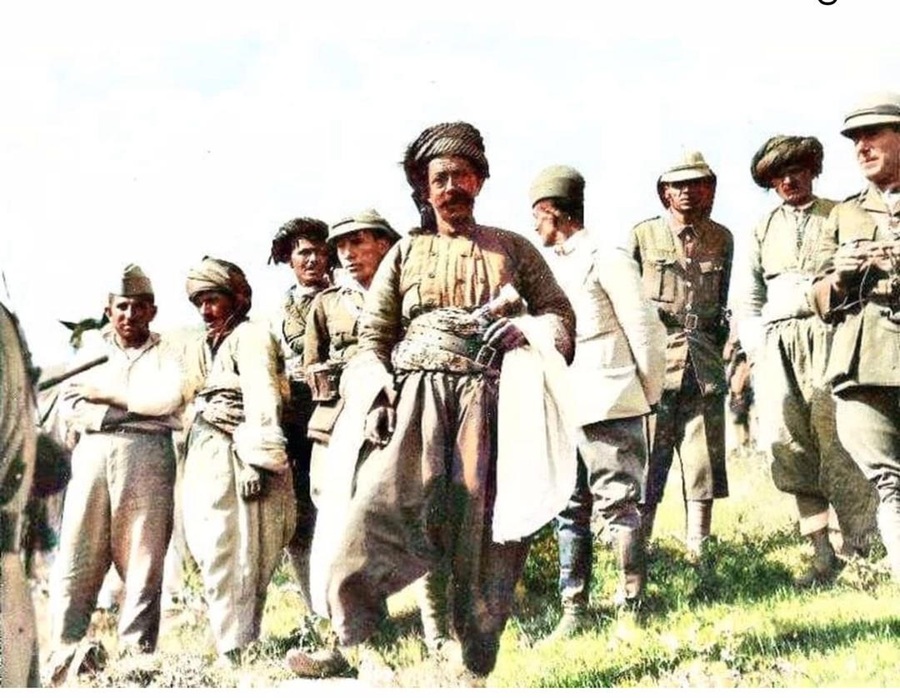Between World Wars I and II and the collapse of the Ottoman Empire, the Kurds were supposed to have an independent state under the leadership of Sheikh Mahmoud Hafid. Most of the Kurdish tribes agreed with him and expressed their support for him and helped him with their property and force. As a result, the flag of the Kurdish government was hoisted in Sulaimani and he was appointed as the king of Kurdistan. However, the conspiracies of the British military ruler and his allies against the Kurdish state and their interventions in 1919, put King Mahmoud at war and he was arrested while he was injured in Bardaqareman; initially sentenced to death and later commuted to ten years in prison. However, the fire of the revolution restarted and the release of Sheikh Mahmoud became a public demand, so they were forced to cancel his ten-year prison sentence, and on 30/9/1922, Sheikh Mahmoud returned to Kurdistan and regained power as king. Again, he was harassed by the British, given dozens of problems and disrespected his authority and the personalities around him. The king was forced to resist the British and fighting broke out again between the Kurdish forces and two joint British and Iraqi armies.

The British and Iraqi forces used bribes, conspiracy, weapons, and force to remove many journalists, intellectuals, tribal chiefs, and people close to Sheikh Mahmoud and put him at war. The British army and the Iraqi government defeated King Mahmoud's forces with bombs, aircraft, and heavy weapons and narrowed the borders of their power. They were forced to retreat to Penjwen and the borders of Mariwan and Bana. The forces, headquarters, and some of the officials around the Sheikh's family were settled in Penjwen and the Mariwan border. In 1925, it was decided to move the Sheikh and his family to Bashmakh.
A force from Mariwan went to support the Sheikh's force and dealt a heavy blow to the British and Iraqi forces that had come to occupy Penjwen. A British document prepared as a report describes the attack of the force in Mariwan as follows: “In September 1926, Sheikh Mahmoud Hafid formed a force of Iranian Kurds, especially in Galbakhi, Rezaw, Tileko and gathered in the Mariwan region and captured the Penjwen area with that force.”

In 1926, a heavy battle took place between the British army and King Mahmoud's forces in Nalparez and Sebwaran. The enemy used a lot of cannons, aircraft, and bombs against the Kurdish forces, but the heroic resistance of the Kurdish army prevented the enemy from advancing. The Kurds were fighting for survival and a large number of British soldiers were killed and injured. Even a British plane bombing the battlefields was forced to land in the area, and the two pilots fell into the hands of the Kurds. They were moved to a headquarters under the control of Sheikh Mahmoud's forces, who were then in the village of Wilazher in Mariwan.
The British describe the battle and the capture of their pilots in a document. The British and commanders asked to see the captured pilots. They appointed a man named Dr Shua to meet the pilots, and in 1926, they arrived in the village of Wilazher. Dr. Shua met the captured pilots, who were in good health and dressed in Kurdish clothes. After making sure of their health, he went to see Sheikh Mahmoud and spoke together.
When Malik Mahmud's forces were stationed in Mariwan, the conflict between Mahmoud Khan Kani Sanan and Mahmoud Khan Dizli had escalated. At that time, the conflict between the two tribal chiefs, who were the main forces of King Mahmoud's army, dealt a heavy hit to the Kurdish revolution and struggle. In such a difficult situation, the Iranian, British, and Iraqi governments decided to attack Penjwen and Mariwan simultaneously and put pressure on the Kurdish forces.

Mahmoud Khan Kani Sanan
In a report entitled “A Report on the Operations Relating to the Occupation of Penjwen from April 18 to May 7, 1927”, preserved in the British National Archives, it describes the battle. According to the report translated into Kurdish by Soran University and published in 2019, heavy fighting took place between the Kurds and the occupying forces and the occupiers were defeated heavily. The report says the British and Iraqi forces have drawn up a detailed military plan to capture Penjwen, in which two strong military units, huge artillery, air force, and Iraqi and British warplanes participated. The report mentions the importance of warplanes and heavy weapons and writes that without artillery, machine guns, and bombs of warplanes, it would have been impossible to capture Penjwen and defeat the Kurds.

After the capture of Penjwen, Sheikh Mahmoud stayed in the villages and mountains on the Iranian side and the Mariwan border for several years.
When Sheikh Mahmoud's support forces were dispersed, the Iranian military announced that they insisted on expelling him from Mount Suren, a border area of Mariwan, on May 14. On the Iraqi side, the armed forces and the British were preparing for a simultaneous attack if the Sheikh crossed the border. The readiness of the enemies and the conflict between the Kurdish forces put the great Sheikh in trouble and forced him to negotiate with the British.
On May 13, 1931, before two armies attacked him from both sides of the border, Sheikh Mahmoud was forced to stop his movement and entered Iraq that night. After talks with Captain Vivan Holt, sent on his behalf by Sir Francis Humphreys, the British High Representative, the Sheikh surrendered.
-Barzenji, Ma'rouf, Omar, (2000). Mahmoud Khan Dizli, The Revolutionary of East part of Kurdistan, 2nd edition, Sulaimani, Azad Press. (Page 117)
-Khwaja, Ahmad (2016). "What I saw", prepared by Sidiq Salih, Sulaimani, Zhin Center. (Page 308)
-(2019) Translated from English by Rawand Sabah Ahmad, "The Report of the Occupation of Penjwen from April 18 to May 7, 1927" Soran University, Tehran. (Page 127)
-Barzenji, Ma'rouf, Omar, (2000). Mahmoud Khan Dizli, The Revolutionary of East part of Kurdistan, 2nd edition, Sulaimani, Azad Press. (Page 124)








